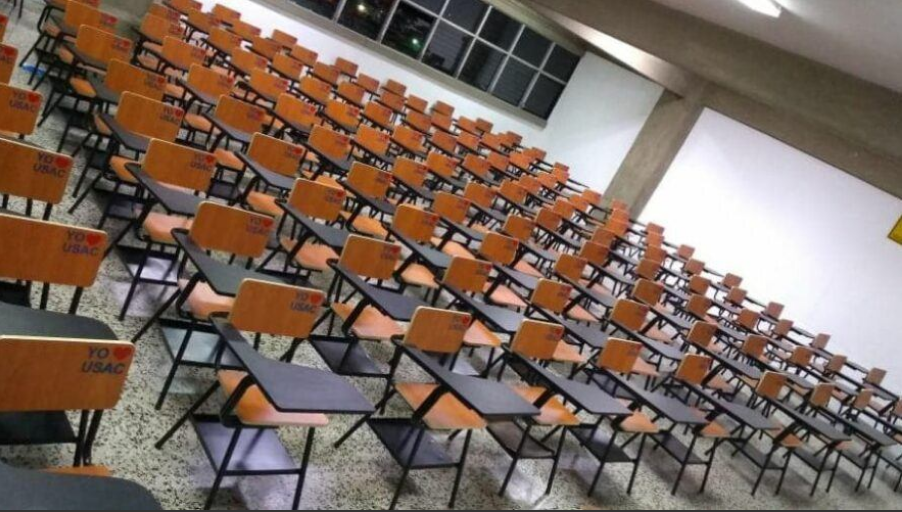La Universidad de San Carlos de Guatemala se reforma en silencio
Palabras clave:
Universidad Abierta, Educación a distancia, currículo, plataforma educativaResumen
Durante 46 meses consecutivos, la pandemia de Covid-19 y la usurpación del campus central de la Universidad de San Carlos forzaron a suspender las clases en la modalidad presencial. Se ha recurrido a herramientas digitales que reformaron el proceso enseñanza y aprendizaje. Las acciones emergentes generaron improvisaciones y la descontextualización del enfoque y conceptos de la educación universitaria. El autor inicia una serie para que se consolide la adecuación a esta reforma, tanto inesperada como silenciosa, por medio de la Universidad Abierta y la Educación a Distancia o Educación en Línea.
Citas
Allen, J., et al. (2020). How the World Will Look After the Coronavirus Pandemic. Foreign Policy, https://foreignpolicy.com/2020/03/20/world-order-after-coroanvirus-pandemic/
Anyoha, R. (2017) The History of Artificial Intelligence. Science in the News. https://sitn.hms.harvard.edu/flash/2017/history-artificial-intelligence/ Brandtner, M. (20 de marzo de 2020). «Marketing in Zeiten von Corona – 3 Learnings aus China». Obtenido de
Horizont.
Davenport, T. H., & Beck, J. C. (2002). The Attention Economy: Understanding the New Currency of Business. Harvard Business School Press. https://books.google.com/books/about/The_Attention_Economy.html?id=j6z-MiUKgosC
Deloitte. (2023). The Age of Artificial Intelligence: A Brief Story… https://www2.deloitte.com/mt/en/pages/rpa-and-ai/articles/mt-age-of-ai-1-a-brief-history.html
Drishti Foundation. (2022). Digital University». Drishti Daily Editorial. https://www.drishtiias.com/daily-news-editorials/digital-university
Ebert, J. D. (2012). The Age of Catastrophe: Disaster and Humanity in Modern Times. https://mcfarlandbooks.com/product/the-age-of-catastrophe/
Ellison, N. B. (2004). Telework and Social Change: how technology is reshaping the boundaries between home and work. Westport, Connecticut: Praeger. https://publisher.abc-clio.com/9780313051715/5
Faye, G. (2010). Archeofuturism: European Visions of the Post-catastrophic Age. https://ecologyviewedfromtheright.files.wordpress.com/2019/03/guillam-faye-archeofuturism.pdf
Gellately, R. (2006). Lenin, Stalin and Hitler: The Age of Social Catastrophe. Alfred A. Knopf. https://www.amazon.com/Lenin-Stalin-Hitler-Social-Catastrophe/dp/1400040051
Harvard University. (2024). English 183ts. Taylor Swift and Her World. Obtenido de Harvard University, Department of English. https://english.fas.harvard.edu/english-183ts-taylor-swift-and-her-world
Hayden, J. (2023). The Intersection of Remote Work and Artificial Intelligence. https://medium.com/@julianhayden/the-intersection-of-remote-work-and-artificial-intelligence-e10df3d54519
Lane, S., Atchley, P., & Mennie, K. (2021). Charting a way forward: navigating the Attention Economy. https://psycnet.apa.org/record/2020-63917-009
McKinsey & Company. (2022). What are Industry 4.0, the Fourth Industrial Revolution, and 4IR? https://www.mckinsey.com/featured-insights/mckinsey-explainers/what-are-industry-4-0-the-fourth-industrial-revolution-and-4ir
Mejía Dávila, M. V. (2023). Raíces medievales de la Universidad de San Carlos de Guatemala. Guatemala: Instituto de Análisis e Investigación de los Problemas Nacionales, USAC, 378 pps.
Mintzer, A. (2020). Paying Attention: The Attention Economy. https://econreview.studentorg.berkeley.edu/paying-attention-the-attention-economy/
Nanning, Z. (2019) The new era of artificial intelligence. Chinese Journal of Intelligent Science and Technology. https://julien-data.medium.com/the-new-era-of-artifical-intelligence-8e9c5bd51b65?responsesOpen=true&sortBy=REVERSE_CHRON
Nelson-Field, K. (2020). The Attention Economy and How Media Works. Simple Truths for Marketers. Palgrave McMillan. https://www.researchgate.net/publication/338387815_The_Attention_Economy_and_How_Media_Works_Simple_Truths_for_Marketers
Organización de las Naciones Unidas para la Educación, la Ciencia y la Cultura. (1998). Declaración Mundial sobre la Educación Superior en el siglo XXI: visión y acción. París, Francia: UNESCO. https://www.iesalc.unesco.org/ess/index.php/ess3/article/view/171
Orlik, T., Rush, J., Cousin, M., & Hong, J. (2020). Coronavirus Could Cost the Global Economy $2.7 Trillion. Here’s How. https://www.bloomberg.com/graphics/2020-coronavirus-pandemic-global-economic-risk/
Patel, N. (2020). What The Coronavirus (COVID-19) Means For Marketers. https://neilpatel.com/blog/covid-19-marketing/
Sassoon, A. S. (1991). Prison Notebooks. En T. Bottomore, L. Harris, V. G. Kiernan, & R. Miliband, The Dictionary of Marxist Thought (págs. 446-447). Blackwell Publisher Ltd. https://www.academia.edu/25523353/Dictionary_of_marxist_thought
Skains, R. L. (2019). Digital authorship. Publishing in the Attention Economy. Cambridge, United Kingdom: Cambridge University Press. https://www.researchgate.net/publication/330760505_Digital_Authorship_Publishing_in_an_Attention_Economy
Tanner, S. (2020). Delivering Impact with Digital Resources. Planning strategy in the attention economy. London, United Kingdom: Facet Publishing.
The Lancet. (2021). A Pandemic Era. https://www.thelancet.com/journals/lanplh/article/PIIS2542-5196(20)30305-3/fulltext
Whitfill Roeloffs, M. (2024). EU Wants Taylor Swift’s Help Mobilizing Young Voters For European Parliament Elections. https://www.forbes.com/sites/maryroeloffs/2024/01/10/eu-wants-taylor-swifts-help-mobilizing-young-voters-foreuropean-
parliament-elections/
Williams, J. (2018). Stand out of our light: Freedom and Resistance in the Attention Economy. Cambridge, United Kingdom: Cambridge University Press. https://www.cambridge.org/core/books/stand-out-of-our-light/3F8D7BA2C0FE3A7126A4D-9B73A89415D
Winkler, H. A. (2015). The Age of Catastrophe: A History of the West 1914-1945. Yale University Press. https://yalebooks.yale.edu/9780300204896/the-age-of-catastrophe

Descargas
Publicado
Cómo citar
Número
Sección
Licencia

Esta obra está bajo una licencia internacional Creative Commons Atribución 4.0.
Los autores/as que publiquen en esta revista aceptan las siguientes condiciones:
- Los autores/as conservan los derechos de autor y ceden a la revista el derecho de la primera publicación, con el trabajo registrado con la licencia de atribución de Creative Commons 4.0, que permite a terceros utilizar lo publicado siempre que mencionen la autoría del trabajo y a la primera publicación en esta revista.
- Los autores/as pueden realizar otros acuerdos contractuales independientes y adicionales para la distribución no exclusiva de la versión del artículo publicado en esta revista (p. ej., incluirlo en un repositorio institucional o publicarlo en un libro) siempre que indiquen claramente que el trabajo se publicó por primera vez en esta revista.
- Se permite y recomienda a los autores/as a compartir su trabajo en línea (por ejemplo: en repositorios institucionales o páginas web personales) antes y durante el proceso de envío del manuscrito, ya que puede conducir a intercambios productivos, a una mayor y más rápida citación del trabajo publicado.




